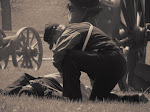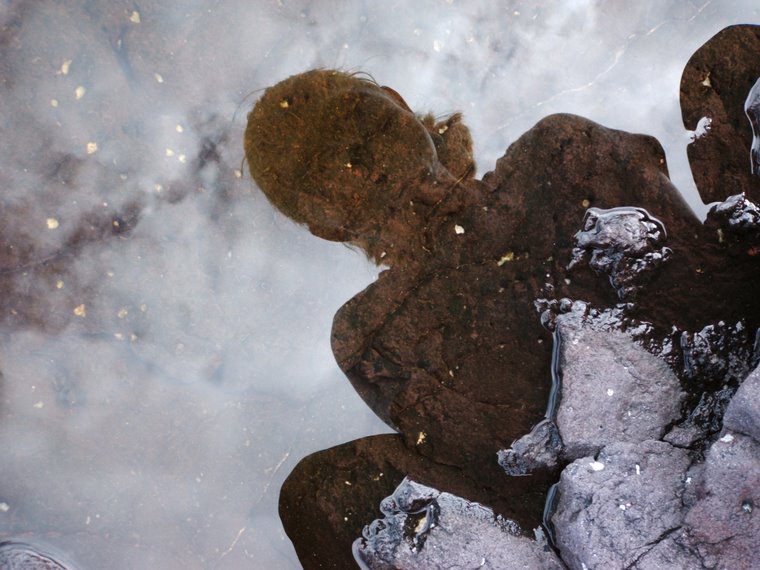
Dear Lady Mary,
My I inquire after my lady's health? How does the weather fair in thy country? It is cold here. My fingers doth suffer greatly, and I am at my wits end trying to find new ways to maintain my body temperature above the freezing point. My cloak does not sufficiently sustain inward warmth. I am in a state of sadness and depression over the resent happenings in my country. Denille is in absolute turmoil. The king is missing, and in court there is murder and secrecies never before thought of. I, here on the battle field, am very confused and do not fully understand what intrigues are and have taken place, but I have stumbled on something most strange and dangerous. Let us pray I do not run my course into that of difficulty, for with my discoveries, I must take on a new role, from loyal citizen of my mighty country, to that of defender and fighter...be it even to my death. I am no longer a man independent of family and rank, but slave to my mission and destiny. I must place myself on the stone alter and allow no one to stop the slaughter that will follow. For this cause do I sorrow. Yet not is fear surrounding me! I see this as my blessing, and I do know in my innermost being that I will hold the victors spoils in the end. But before this shall come to pass, much blood and gore shall flood my soul, and that of the Denillian countryside. So my heart is split into two parts. One of Courage... the other of Blood. I shall not survive.
My brother, Alexis, is missing. I know not where he is, nor do I my husband, who has also gone missing. The sword I once held in safety is also absent, and for these three items I mourn. If it were not for the present circumstances I have been thrust into, I would hastily pursue with all diligence and agony. Yet am I bound with thick iron chains and broad straps of leather. I am not my own. Thy face at this moment is in my mind, setting itself by a warm fireside and gracing all who belay themselves. It is truly beautiful to mine eyes when I do stand by thy side. Thy name, sweet to mine ears does remind me so much of our childhood. You were a daring friend, willing to put up with all that came to my mind. Yet here I doth sit, so much changed from that young girl. I am a warrior now, and with this title follows thoughts of slaying and crimson battle fields. I am no longer that problematic young thing. Do you remember the day I was excepted as a fighter? From that day on we saw little of each other, my training and your courting pulling us apart until finally we saw naught of our old play mates. Those times are so far away now I am hardly able to drag myself back to them. It were better if I did not write of it anyways.
It took great efforts to attain paper and pen to write this brief letter, and even greater to obtain the ink with which to write it. You will be shocked to find out that it is of my own concoction of a bitter bark brew, mixed with my own blood. It is not very dark, seeing as I had to water it down slightly so I would have enough. The paper I got from a dead mans body, who fell in the resent battle with the savages. I almost died in that battle. It is a miracle that I am now even healed, for the wound was severe. My bloody ink comes mainly from this wound. I am able to walk, but with such zealous pain that it is almost not worth the effort. So I remain on my horse, which is not altogether without pain either. I am still able to wield my sword, which is indead a fortunate thing, or I would be dead even now. So many enemies hide in our surrounding wood it is most alarming. But in this battalion of warriors, put together with the most brave and heroic men that none dare defeat us. One day you may say that you were acquainted with the Great Signora Violetta, and all who hear will be in awe of you and your fortune. It seams that when we enter villages, the locals even now will treat us as those from a holy legend. My light is gone...I must go. If thou tryst to sent word back to me, be prepared for no reply. My mission will have me dead in less time than I wish, whether I accomplish it or no. Fare thee well. I shall conquer.
Thy Friend and Sister Forever,
The Great Signora Violetta
My I inquire after my lady's health? How does the weather fair in thy country? It is cold here. My fingers doth suffer greatly, and I am at my wits end trying to find new ways to maintain my body temperature above the freezing point. My cloak does not sufficiently sustain inward warmth. I am in a state of sadness and depression over the resent happenings in my country. Denille is in absolute turmoil. The king is missing, and in court there is murder and secrecies never before thought of. I, here on the battle field, am very confused and do not fully understand what intrigues are and have taken place, but I have stumbled on something most strange and dangerous. Let us pray I do not run my course into that of difficulty, for with my discoveries, I must take on a new role, from loyal citizen of my mighty country, to that of defender and fighter...be it even to my death. I am no longer a man independent of family and rank, but slave to my mission and destiny. I must place myself on the stone alter and allow no one to stop the slaughter that will follow. For this cause do I sorrow. Yet not is fear surrounding me! I see this as my blessing, and I do know in my innermost being that I will hold the victors spoils in the end. But before this shall come to pass, much blood and gore shall flood my soul, and that of the Denillian countryside. So my heart is split into two parts. One of Courage... the other of Blood. I shall not survive.
My brother, Alexis, is missing. I know not where he is, nor do I my husband, who has also gone missing. The sword I once held in safety is also absent, and for these three items I mourn. If it were not for the present circumstances I have been thrust into, I would hastily pursue with all diligence and agony. Yet am I bound with thick iron chains and broad straps of leather. I am not my own. Thy face at this moment is in my mind, setting itself by a warm fireside and gracing all who belay themselves. It is truly beautiful to mine eyes when I do stand by thy side. Thy name, sweet to mine ears does remind me so much of our childhood. You were a daring friend, willing to put up with all that came to my mind. Yet here I doth sit, so much changed from that young girl. I am a warrior now, and with this title follows thoughts of slaying and crimson battle fields. I am no longer that problematic young thing. Do you remember the day I was excepted as a fighter? From that day on we saw little of each other, my training and your courting pulling us apart until finally we saw naught of our old play mates. Those times are so far away now I am hardly able to drag myself back to them. It were better if I did not write of it anyways.
It took great efforts to attain paper and pen to write this brief letter, and even greater to obtain the ink with which to write it. You will be shocked to find out that it is of my own concoction of a bitter bark brew, mixed with my own blood. It is not very dark, seeing as I had to water it down slightly so I would have enough. The paper I got from a dead mans body, who fell in the resent battle with the savages. I almost died in that battle. It is a miracle that I am now even healed, for the wound was severe. My bloody ink comes mainly from this wound. I am able to walk, but with such zealous pain that it is almost not worth the effort. So I remain on my horse, which is not altogether without pain either. I am still able to wield my sword, which is indead a fortunate thing, or I would be dead even now. So many enemies hide in our surrounding wood it is most alarming. But in this battalion of warriors, put together with the most brave and heroic men that none dare defeat us. One day you may say that you were acquainted with the Great Signora Violetta, and all who hear will be in awe of you and your fortune. It seams that when we enter villages, the locals even now will treat us as those from a holy legend. My light is gone...I must go. If thou tryst to sent word back to me, be prepared for no reply. My mission will have me dead in less time than I wish, whether I accomplish it or no. Fare thee well. I shall conquer.
Thy Friend and Sister Forever,
The Great Signora Violetta




